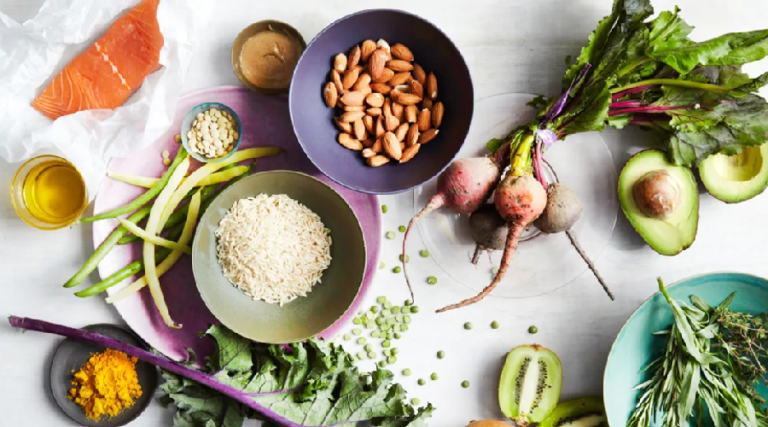Unlock Your Brain’s Potential with Healthy Foods
Your brain is the command center of your body, controlling everything from memory and focus to mood and energy levels. Just like a high-performance engine needs quality fuel, your brain thrives on nutrient-rich foods that enhance cognitive function, support mental clarity, and improve overall brain health. By making smart food choices, you can unlock your brain’s full potential and boost productivity, creativity, and long-term wellness. 1. Fatty Fish: The Ultimate Brain Fuel Fatty fish like salmon, mackerel, and sardines are rich in omega-3 fatty acids, which are essential for brain health. Omega-3s help build brain cell membranes, reduce inflammation, and improve memory and learning abilities. Studies show that regular consumption of omega-3s can lower the risk of cognitive decline and Alzheimer’s disease.Try this: Enjoy grilled salmon with a side of roasted vegetables or add sardines to a fresh salad for a brain-boosting meal. 2. Blueberries: Nature’s Antioxidant Powerhouse Blueberries are…
6 Simple Swaps for a Heart-Healthy Diet
Maintaining a heart-healthy diet doesn’t have to mean giving up your favorite foods. Small, simple changes to your daily meals can make a big difference in your heart health. By making smarter food swaps, you can reduce your intake of saturated fats, sodium, and added sugars while increasing heart-boosting nutrients. Here are six easy swaps to support a healthier heart. 1. Swap Butter for Olive Oil Why? Butter contains high levels of saturated fat, which can raise LDL (bad) cholesterol and increase the risk of heart disease. Olive oil, on the other hand, is rich in heart-healthy monounsaturated fats and antioxidants that help protect blood vessels.Simple Swap: 2. Swap White Bread for Whole Grains Why? White bread and refined grains are stripped of their fiber, leading to blood sugar spikes and increased cravings. Whole grains, such as whole wheat, quinoa, and brown rice, are packed with fiber, which supports heart…
How to Educate Patients on Healthy Food Options
Good nutrition plays a vital role in overall health, disease prevention, and recovery. However, many people struggle with understanding what constitutes a healthy diet and how to make better food choices. As a healthcare provider, nutritionist, or wellness coach, educating patients about healthy food options is key to empowering them to make informed decisions about their well-being. Here are effective strategies to guide patients toward healthier eating habits. 1. Personalize Nutrition Education Each patient has unique dietary needs, health conditions, and cultural preferences. Tailor your recommendations based on their medical history, lifestyle, and personal goals. For example, a patient with diabetes may need guidance on managing blood sugar levels, while an athlete may require a diet rich in protein and complex carbohydrates. 2. Explain the Benefits of Healthy Eating Patients are more likely to make lasting dietary changes when they understand the impact of nutrition on their health. Educate them…
Elevate Your Nutrition: The Path to Wellness
Good nutrition is the foundation of a healthy and fulfilling life. The food we eat directly impacts our energy levels, immune system, mental clarity, and overall well-being. When we make mindful choices about what we consume, we unlock the potential for long-term health and vitality. If you’re looking to elevate your nutrition and embark on a path to wellness, here’s how to get started. 1. Focus on Whole, Unprocessed Foods Whole foods, such as fruits, vegetables, lean proteins, whole grains, and healthy fats, provide essential nutrients that the body needs to function optimally. Unlike processed foods, which often contain additives, refined sugars, and unhealthy fats, whole foods nourish the body naturally and promote overall wellness. 2. Prioritize Nutrient-Dense Choices Nutrient-dense foods provide a high concentration of vitamins, minerals, and antioxidants per calorie. Some of the best choices include: 3. Balance Your Macros A well-rounded diet includes a healthy balance of…
Which Foods Should You Eat for Better Health?
Maintaining good health starts with the food you eat. A well-balanced diet provides essential nutrients that support your immune system, boost energy levels, and promote overall well-being. But with so many options, which foods should you focus on for better health? Here’s a list of some of the best foods to include in your diet. 1. Cruciferous Vegetables Cruciferous vegetables like broccoli, cauliflower, Brussels sprouts, and cabbage are rich in vitamins C and K, fiber, and antioxidants. These vegetables help support digestion, detoxify the body, and may reduce the risk of certain chronic diseases. 2. Citrus Fruits Fruits such as lemons, limes, grapefruits, and tangerines are packed with vitamin C, which strengthens the immune system, supports collagen production for healthy skin, and helps the body absorb iron from plant-based foods. 3. Sweet Potatoes Sweet potatoes are an excellent source of beta-carotene, vitamin A, fiber, and potassium. They help improve eye…
Nutrient-Dense Foods for Better Health and Wellness
In a world full of processed and fast foods, it’s essential to focus on eating nutrient-dense foods to fuel your body with the vitamins, minerals, and essential nutrients it needs to thrive. Nutrient-dense foods provide maximum nutrition with minimal calories, helping to boost energy, support immunity, improve digestion, and enhance overall well-being. By incorporating these powerhouse foods into your daily diet, you can improve your health, maintain a healthy weight, and feel your best. What Are Nutrient-Dense Foods? Nutrient-dense foods are rich in essential nutrients such as vitamins, minerals, fiber, healthy fats, and protein while being relatively low in calories. These foods are natural, whole, and minimally processed, making them a great choice for overall health. Top Nutrient-Dense Foods for Better Health 1. Leafy Greens Leafy greens like spinach, kale, Swiss chard, and collard greens are packed with vitamins A, C, and K, folate, iron, and fiber. These nutrients help…
Elevate Your Gut Health with These Healthy Choices
Your gut plays a vital role in overall well-being, affecting digestion, immunity, mood, and even skin health. A balanced gut microbiome—made up of trillions of beneficial bacteria—helps process nutrients, fight inflammation, and support bodily functions. If your gut health is out of balance, you may experience bloating, fatigue, digestive discomfort, and even weakened immunity. Fortunately, making the right dietary choices can enhance gut health and restore balance. 1. Add More Fiber-Rich Foods Fiber is essential for digestion and gut health. It feeds beneficial bacteria in the gut, promoting their growth and activity. High-fiber foods also help prevent constipation and support regular bowel movements. Include fiber-rich choices such as whole grains (oats, quinoa, brown rice), fruits (apples, berries, bananas), vegetables (broccoli, carrots, leafy greens), and legumes (lentils, beans, chickpeas) in your diet. 2. Incorporate Probiotic-Rich Foods Probiotics are live bacteria that help balance the gut microbiome and improve digestion. They promote…
A Guide to Nutrition: Eating for Wellness and Health
Proper nutrition is the foundation of overall well-being, influencing everything from energy levels to long-term health. The food we eat directly impacts our immune system, mental clarity, and ability to prevent chronic diseases. By making conscious choices about our diet, we can fuel our bodies with the right nutrients, promoting vitality and longevity. A balanced diet provides essential nutrients that support bodily functions, from energy production to cell repair. Macronutrients—carbohydrates, proteins, and fats—work alongside micronutrients like vitamins and minerals to keep our bodies functioning at their best. When we consume nutrient-dense foods, we enhance our physical and mental well-being, reducing the risk of illness and increasing overall vitality. Carbohydrates provide the energy needed for daily activities and brain function. However, choosing the right carbohydrates is essential. Whole grains, fruits, and vegetables offer fiber, vitamins, and slow-releasing energy, making them healthier options compared to refined sugars and processed foods. Some of…
Nutritional Benefits of Berries You Should Know
Berries are among the healthiest foods you can add to your diet. Packed with essential vitamins, antioxidants, and fiber, they offer a wide range of health benefits while being naturally sweet and low in calories. Whether you love strawberries, blueberries, raspberries, or blackberries, these tiny fruits provide a powerhouse of nutrition that supports overall wellness. Here’s why you should incorporate more berries into your diet. 1. Rich in Antioxidants Berries are loaded with antioxidants like anthocyanins, ellagic acid, and resveratrol, which help protect the body from oxidative stress and free radical damage. These compounds play a crucial role in reducing inflammation, slowing aging, and preventing chronic diseases such as heart disease and cancer. Tip: The deeper the color of the berry, the higher its antioxidant content! 2. Supports Heart Health Eating berries regularly has been linked to improved heart health. They help lower LDL (bad) cholesterol levels, reduce blood pressure,…
7 Best Healthy Snacks for Weight Loss Success
When it comes to weight loss, snacking can either be your best friend or your worst enemy. Choosing the right snacks can keep hunger at bay, prevent overeating at mealtimes, and provide essential nutrients to keep your metabolism running efficiently. The key is to opt for nutrient-dense, low-calorie, and high-protein or fiber-rich options that satisfy cravings without adding unnecessary calories. Here are seven of the best healthy snacks to support your weight loss journey. 1. Greek Yogurt with Berries 🥄 Why It Works: Greek yogurt is packed with protein, which helps keep you full for longer, while berries provide fiber and antioxidants. This combination stabilizes blood sugar levels and satisfies sweet cravings naturally. Tip: Opt for unsweetened Greek yogurt and add fresh strawberries, blueberries, or raspberries for natural sweetness. 2. Hummus and Veggie Sticks 🥕 Why It Works: Hummus, made from chickpeas, is rich in protein and fiber, while crunchy…










